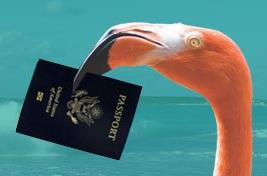 Ben Hyde has an interesting bunch of thoughts about verification friction:
Ben Hyde has an interesting bunch of thoughts about verification friction:
We recently got new passports, a project that was at least a dozen times more expensive and tedious than doing my taxes. I once had a web product that failed big-time. A major contributor to that failure was tedium of getting new users through the sign-up process. Each screen they had to step triggered the lost of 10 to 20% of the users. Reducing the friction of that process was key to survival. It is a thousand times easier to get a cell phone or a credit card than it is to get a passport or a learner’s permit. That wasn’t the case two decades ago.He mentions some cases where friction may actually be socially useful, as in making it harder to get liquor and easier to get condoms, or some automobile traffic engineering. Then he gets to the especially interesting part.— Friction, by Ben Hyde, Ascription is an Anathema to any Enthusiasm, 10 May 2007
In Internet identity, some camps are trying to raise the friction, while others are trying to lower it:
Privacy and security advocates are attempting to lower the temp. and increase the friction. Thus you get the mess around the passport, real-id, and the banks. Wearing that hat it seems perfectly reasonable that one should present photo id when you vote, or have your biometrics captured if you cross a boarder. On the other hand there are those who seek in the solution to the internet identity problem a way to raise the temperature and lower the friction. That more rather than less transactions would take place. That more blog postings garner good coments, that more wiki pages will be touched up, that more account relationships will emerge rather than less.And in meatspace we’ve seen that increasing the friction has consequences such as the U.S. now being considered the most traveler-unfriendly country in the world, and as Ben points out, A Caribbean island is offering to pay U.S. citizens the cost of getting a passport, because so many people are not wanting to go through the hassle anymore.
Ben sees this, at least in the Internet space, as a matter of striking a balance. I see much of it as counterproductive design.
For example, one of Ben’s examples is banks requiring multiple pieces of information to log in, which he has to share with his wife, since they share an account. That’s an ancient problem, easily solved by letting multiple account users have multiple accounts. I don’t mean multiple bank accounts in this case; merely two online accounts to access the bank account.
Ben points out that some of the political friction implemented in recent years, such as making it harder for people to vote, may redound to the benefit of a particular political party. More difficult passports could, as well, because people travelling and getting to know more about the world could redound to the benefit of a different political party. I might be for the passport procedures, if I thought they actually did any good, but I’ve seen no evidence that they do. One would think that before implementing changes that make it much harder for people to get a document that they need to exercise a basic right (travel) that a compelling case would be made for the need for such changes.
For banks, doing something beyond simple username and password has become necessary due to phishing, which most bank online users can see for themselves. The actual implementation may miss some stitches, as in Ben’s spouse account sharing case.
For many of the non-Internet friction increases of recent years, no such case has been made.
-jsq